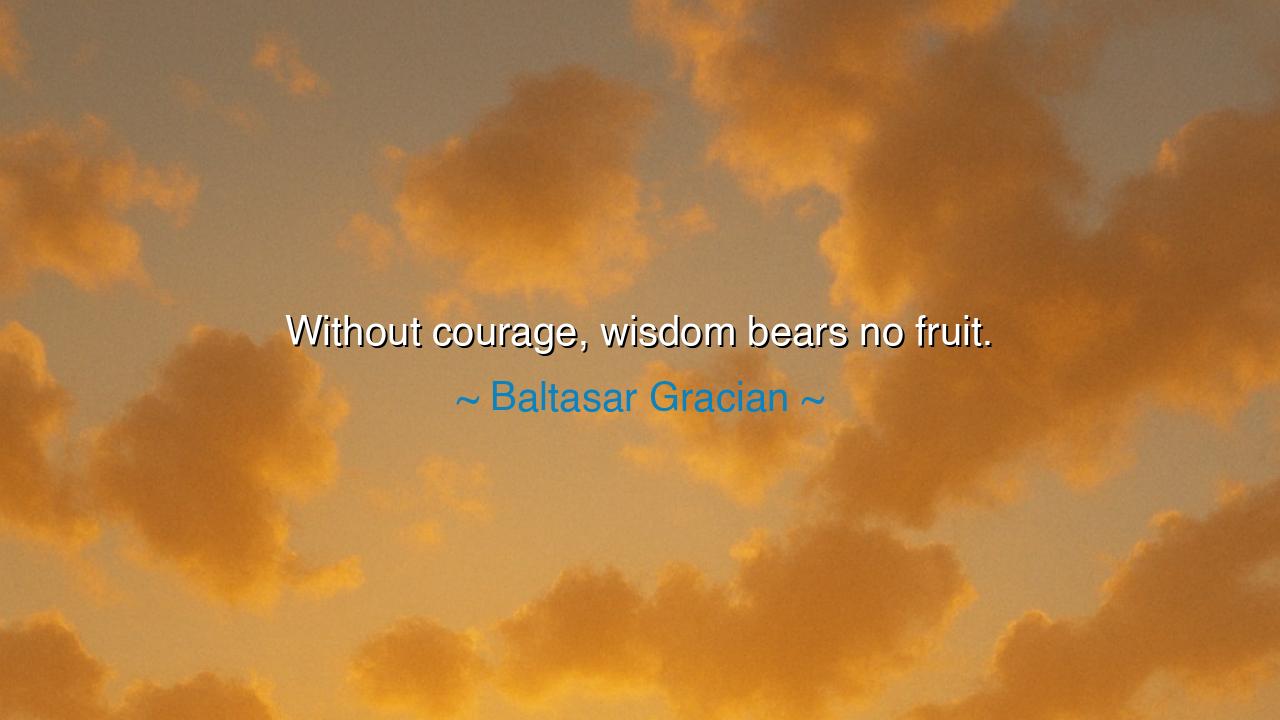
Without courage, wisdom bears no fruit.






“Without courage, wisdom bears no fruit.” Thus wrote Baltasar Gracián, the Spanish Jesuit and moral philosopher of the seventeenth century, a man whose pen carved truths sharp as the blade of reason and deep as the heart of faith. In this single line, he unveils one of the most enduring paradoxes of the human condition: that wisdom, though noble and radiant, remains sterile unless it is animated by courage. To know what is right is not enough; one must also have the strength to live it. To see truth is not the same as to act upon it. For knowledge, however vast, is like a seed locked in stone—only through the fire of bravery does it crack open and grow.
Gracián lived in an age of peril, a time when speaking the truth could summon the wrath of kings and inquisitors alike. As a Jesuit priest and thinker, he understood that wisdom alone—the discernment between good and evil, the understanding of virtue and vice—was not sufficient to change the world. Many know the path of righteousness, yet few dare to walk it. He saw how fear shackles the intellect and how timidity turns vision into silence. Thus, his words come to us not as an observation but as a challenge: wisdom without courage is like light without warmth, knowledge that shines but never nourishes.
Consider the story of Socrates, the philosopher of Athens, whose life embodied Gracián’s truth long before it was spoken. Socrates possessed the highest wisdom of his time—the understanding that he knew nothing, and that self-examination was the root of virtue. Yet what made him immortal was not his intellect, but his courage. When condemned to death for corrupting the youth and questioning the gods, he did not flee or recant. He drank the hemlock with serenity, choosing death over hypocrisy. His wisdom bore fruit because it was watered by bravery; it lived on, not in parchment or theory, but in the hearts of those who followed his example.
So it is with all who have transformed thought into destiny. Galileo Galilei saw with his telescope the truth that the earth moved around the sun, yet it was his courage—his willingness to speak against dogma—that made his discovery a beacon for generations. Rosa Parks knew in her heart that all people were created equal, but it was her courage to act—to remain seated when the world demanded her submission—that bore fruit for millions. In each of these lives, we see that wisdom is the vision of truth, and courage is the breath that gives it life.
Gracián’s words also warn us against a subtle danger—the comfort of thinking without doing. Many men and women pride themselves on their knowledge, their discernment, their ability to see folly in others. Yet knowledge without action is a barren field, and wisdom without risk becomes cowardice disguised as prudence. The wise man who hides his truth from the world out of fear is no better than the fool who knows nothing at all. For in the end, it is not the thoughts we keep but the deeds we dare that define us. Courage is the bridge between knowing and becoming.
But courage is not merely the roar of battle or the defiance of tyrants. Sometimes it is quiet and unseen. It is the teacher who speaks truth in a system built on lies, the friend who forgives instead of retaliating, the individual who stands firm in integrity when compromise would bring reward. It is the courage to act according to conscience, even when the world calls it folly. This is the courage that Gracián speaks of—the courage that allows wisdom to bear its sacred fruit in daily life.
Therefore, let this teaching be passed down: Seek not only to be wise, but to be brave. When you know what is right, do not delay. When truth stirs within you, do not silence it out of fear. For wisdom that hides is wasted, and knowledge that trembles bears no harvest. Let your thoughts become deeds, your insight become action, your conviction become creation. For as Baltasar Gracián teaches, the fruit of wisdom grows only on the tree of courage, and it is this fruit—borne of both thought and daring—that nourishes the world and redeems the soul.






AAdministratorAdministrator
Welcome, honored guests. Please leave a comment, we will respond soon